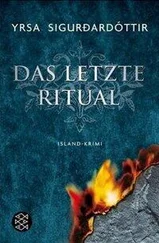Thóra stood up, delighted to be free. “Yes, by all means. We’ll talk about it tomorrow. Don’t worry about me. I’ll be here all weekend and there’s plenty of time to discuss it.” As Thóra slung her bag over her shoulder, she noticed an awful smell and wrinkled her nose. “What’s that stink?” she asked Jónas. “I smelled it out in the car park too. Is there a fish-oil factory near here?”
Jónas took a few deep breaths. Then he looked at Thóra with a blank expression. “I can’t smell anything. I suppose I’ve got used to the goddamn stench,” he said. “A whale has washed up just down the beach from here. When the wind’s in a certain direction, the smell wafts over the grounds.”
“What?” Thóra said. “Do you just have to wait for the carcass to rot away?” She pulled a face when another wave of the stench swept in. If only the problem she was here to deal with was something like this, it would be a cinch.
“You get used to it,” Jónas said. He picked up the telephone and dialed a number. “Hi. I’m sending Thóra over. Have someone show her to her room and fix a massage for her this evening.” He said goodbye and put the receiver down. “If you go to reception, I’ve reserved you the best room, with a lovely view. You won’t be disappointed.”
A young girl accompanied Thóra from the reception to the much-praised room. She was so small that she barely reached up to Thóra’s shoulder. Thóra disliked letting such a slip of a girl carry her bag for her, but had no say in the matter. She was glad that her luggage was not that heavy, even though, as always, she had brought far too much with her. Thóra was convinced that different laws applied on holiday from everyday life, that she would wear clothes that she normally neglected in her wardrobe, but she always ended up in the same clothes as usual. She followed the girl down a long corridor that appeared wider than it was because of the skylight that ran its length. The evening sun shone on the thin, fair hair of the girl in front of her.
“Is this a fun place to work?” Thóra asked, making small talk.
“No,” replied the girl without turning around. “I’m looking for another job. There’s just nothing going.”
“Oh,” said Thóra. She had not expected such a frank answer. “Are the people you work with boring?”
The girl looked back over her shoulder without slowing her pace. “Yes and no. Most of them are all right. Some are real idiots.” The girl stopped by one of the doors, fished a plastic card out of her pocket, and opened it. “But I’m probably not the best judge. I’m not too keen on the bullshit they try to feed the guests.”
For the hotel’s sake, Thóra hoped that this girl did not have much contact with the customers. She wasn’t exactly the world’s best sales-woman. “And is that why you want to quit?” she asked.
“No. Not exactly,” the girl answered, showing Thóra into the room. “It’s something else. I can’t explain exactly. This is a bad place.”
Thóra had entered the room first and couldn’t see the girl’s face as she said this. She couldn’t tell if she was serious, but the tone of her voice suggested that she was. Thóra looked around the beautiful room and walked over to a wall of glass overlooking the ocean. Outside was a small terrace.
“Bad in what way?” she asked, turning to look at the girl. The view implied quite the opposite; the waves glistened beyond an empty, peaceful beach.
The girl shrugged. “Just bad. This has always been a bad place. Everyone knows that.”
Thóra raised her eyebrows. “Does everyone know that? Who’s ‘everyone?’ ” If the place had a bad reputation that the sellers knew about but had neglected to mention, it might provide some flimsy grounds for a compensation case.
The girl looked at her with the scorn only a teenager can muster. “Everyone, of course. Everyone here, anyway.”
Thóra smiled to herself. She didn’t know the population of the southern coast of Snæfellsnes, but knew that the word “everyone” could not cover many people. “And what is it that everyone knows?”
Suddenly the girl became evasive. She thrust her hands into the pockets of her far-too-large jeans and looked down at her toes. “I’ve got to go. I shouldn’t be talking to you about this.” She spun around and walked out into the corridor. “Maybe later.” In the doorway she stopped and looked imploringly at Thóra. “Don’t tell Jónas I’ve been gossiping about this. He doesn’t like me talking to the guests too much.” She rubbed her left hand between the thumb and index finger. “If I want to be able to find work, I need a reference. I want to work at a hotel in Reykjavík.”
“Don’t worry. I’m not an ordinary guest. I’ll tell Jónas that you’ve been particularly helpful and ask his permission to talk to you properly when things are quieter. Jónas asked me to come here to investigate various matters. I think you can help me, and that would help him too.” Thóra looked at the girl, who glared at her suspiciously. “What’s your name, anyway?”
“Sóldís,” the girl replied. She stood in the doorway for a moment, as if unsure what to do, then smiled weakly, said goodbye and left. Bergur Ketilsson walked at a leisurely pace, even though he knew that his wife was waiting for him at home with his nightly coffee. He preferred to spend the evening alone in the great outdoors rather than sitting at home with her in oppressive silence and fake marital bliss. He groaned at the thought. They had been married for twenty years, on reasonably good terms, but there had never been much passion between them, not even during their short courtship. They weren’t that way inclined, or at least she wasn’t. He had only recently discovered that side to his character—a little late to realize it, at forty. Life would doubtless have treated him differently had he found out before he married Rósa, the albatross around his neck. Perhaps he would have gone to Reykjavík to study instead. As a young man, he had taken delight in the Icelandic language, although he had never hinted at it to anyone. There was little to test the intellect of a lonely farmer. He scanned the eider nests mournfully. The recent cold snap had taken its toll on the ducklings. There would be fewer nests next year.
He walked on. In the distance he saw the hotel roof above the rocks on the beach. Silently he focused on it and tried to picture what went on inside, but he couldn’t imagine. He shrugged and continued on his way. As he was feeling depressed, he decided to take the longer route home, via the bay. This was not completely random, because he wanted to know how the hatching seabirds had fared during the cold spell. Quickening his pace, he trudged on, deep in thought. The hotel was behind the emotional crisis that had seized him. If it had not been built, he would have gone on with his life, reconciled to it, neither happy nor sad. He could never form a firm opinion about what went on there, as in its way it had brought him too much joy and too much confusion for him to be able to think logically about it. Spotting a nest, he approached it slowly. Two tiny ducklings were lying dead inside. The mother eider was nowhere to be seen, so perhaps the cold had killed her too.
In the bay, the story was the same. He saw a few chicks in the nests resting on each ledge. Perhaps that was some consolation. Next year the eider and the scavenging seabirds would still be evenly matched. Turning from the cliff, he headed toward the farm. He walked slowly, reluctant to arrive. Not even the stench from the beached whale upset him; it suited his mood. Bergur quickened his pace slightly. Perhaps he should rush home and tell Rósa that he had found another woman. More fun, cleverer, prettier, and younger too. A better woman than her in every way. For an instant, it seemed the right thing to do. He would give Rósa everything—the farm, the cattle, the horses, the eider colony. He would not have any use for them in his new, happy life. Then this dreamlike vision faded. Rósa could not run the farm by herself and would hardly rejoice at the news. She had never been particularly impressed by the countryside or the farm, greeting everything with the same flat expression bordering on indifference. The only thing that got a reaction out of her was the cat. The same went for their married life: she was never furious, never ecstatic. The strange thing was that he used to be exactly the same, but now he was a completely different man.
Читать дальше












